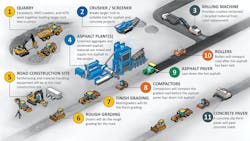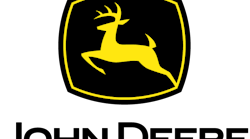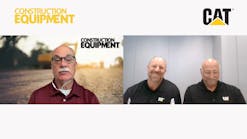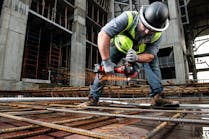Deere’s Surprising Wirtgen Buy: “Watch What We Do”
Viewed through the lens of Deere & Company’s June 1 announcement of a $5.2-billion deal to purchase the Wirtgen Group, Deere CEO Sam Allen’s words in a one-on-one interview with Construction Equipment during Conexpo in March were prescient. Two of the answers stand out in the context of the blockbuster acquisition.
Allen puts in considerable time talking to customers, and the Construction & Forestry division has worked hard to convey its “listening and responding” public relations stance, which is meant to contrast a perception of Caterpillar as a corporate monolith telling the industry what it should want—such as a motor grader without a steering wheel.
With that customer focus in mind, CE asked Allen to identify the No. 1 thing customers ask him.
“They want more than anything to know that we are committed long term to continuing to grow our presence and grow our product lines,” Allen said (left).
“Then, just wanting to make sure, they’ll ask, ‘Now how big is Ag versus Construction?’ and then based on that, ‘Are you really going to apply the capital and R&D to keep Construction moving forward?’ And we’ve always said, ‘Yes, we are, very much so—watch what we do and judge us by what we do.’”
And what a thing Deere has done. In a single transaction, the company has added five internationally known brands (Wirtgen, Hamm, Vogele, Kleemann, and Benninghoven) and a host of products it has never had, including milling machines, asphalt and concrete pavers, rollers, and crushers (see the chart below).
Allen’s second answer laid out Deere’s requirements for a partner; it’s no stretch to imagine him speaking directly about Wirtgen (in fact, before the company went silent on supporting information, Allen told industry financial analysts that he had spoken to the Wirtgen Family about a deal in the mid-2000s when he headed Construction & Forestry.)
We asked Allen, “Specifically on the Construction side, what would it take for you to consider an acquisition? Is there a technology or product line, something you wish you had?”
“Part of it is, you would have to have a willing seller; the second part for us is it would have to be an extension of what we already do, not a duplication of what we’re doing,” Allen said.
“We wouldn’t buy somebody that’s already making the same excavator lineup we’re making or making the same motor graders—there’s no way to extract synergy,” he continued. “So it would have to be something that would be bolt-on that could extend our presence in the marketplace, and then we do know that anything we would look at would be much more successful if we could also then take it through our No. 1 advantage, which is our dealer network.”
The road building and maintenance portfolio, along with crushers and asphalt plants, extend Deere’s presence through the entire infrastructure process (see infographic at top), and it also seems clear from Allen’s words that at least some Deere dealers will be getting Wirtgen products. But a Deere Construction foothold in Europe may be an equally big prize.
The international component
Mike Woof, the veteran London-based editor for Route One Publishing, breaks down the international component.
“The deal is of enormous significance for John Deere as it will provide the firm a far greater international profile,” Woof says. “While John Deere is very strong in North America, its presence on the international construction machinery market has been more limited. The company has had some successes in Southern Africa through its close relationship with Bell Equipment while the John Deere engine range is also supplied to various OEMs.”
Limited may be an understatement. Aside from efforts in Russia over the past 10 years or so, continental Europe is devoid of Deere yellow iron. First-time North American visitors to Bauma and Intermat often ask why there is no Deere presence. Only John Deere Power Systems, with an engine plant in France, exhibits at the shows and is somewhat known in the EU.
Wirtgen’s European dealers may finally give Deere Construction & Forestry the magic door in.
“Acquiring the Wirtgen Group will provide John Deere with a strong stable of premium-quality road machinery brands, as well as global distribution and manufacturing in key territories including Europe, China, and Latin America,” Woof says.
In an industry where rumors can fly at the speed of light, both companies did an amazing job keeping news of the deal under wraps. “There were no rumors about these discussions in the construction or equipment industry prior to the deal being announced,” Woof says. “Both John Deere and the Wirtgen Group managed very effectively to keep their talks quiet.”
From a public relations standpoint, Deere and Wirtgen played it straight down the middle, highlighting rationales touting the benefits to both companies. Allen and two of his C-suite executives conducted a conference call with Wall Street financial analysts the day the deal was announced, and Wirtgen had a deal-related edition of its company magazine already prepared—but then the information door slammed shut.
(Continued below chart.)
Distribution questions
Dealers aren’t talking, nor are field personnel. Some of this is by design, of course, but much of it is because few seem to know the eventual outcomes for sales, service, and customers.
Under 40 in Construction Equipment honoree Ernie Stephens, corporate equipment manager for Superior Construction in Portage, Ind., is both a Wirtgen and Deere user. He’s upbeat.
“Very exciting times,” Stephens says. “My initial reaction was that I didn’t believe it. I heard it on Bloomberg on the way into work. I had to call a few of my sources to confirm it. Wirtgen is such a growing company and seems to be doing everything right thus far, at least from what we can see in the U.S. We also share a very close relationship with John Deere and their dealers, so I think my second reaction was that excitement.
“It’s always nice when you can minimize the number of accounts you have, while at the same time getting better support,” Stephens says “I’m not sure either group quite knows what to expect just yet, but they are excited for what is next.”
The special edition of the Wirtgen Group’s magazine, Forum 53, addresses John Deere’s purchase of the Wirtgen Group and assures those whose fortunes are in any way affected by the deal that it’s business as usual—and will remain so.
“Deere plans to maintain the Wirtgen Group’s existing brands, management, manufacturing footprint, and distribution network,” says Forum 53.
There is certainly no reason at this point not to believe that. Deere and Wirtgen are both intelligent, highly ethical, thoughtful companies that have long histories of fairly treating the people who build, sell, and use their high-quality machines.
In the relatively tight-knit community of construction-equipment manufacturing and distribution, however, opinions about the deal’s possible future implications are inevitable. Reaction in the industry to the purchase, so far, has been a mix of positive comment and a cautious speculation.
The positive might be best summed up by Stephen Bullock, VP for sales and marketing, Power Curbers & Power Pavers: “When a major construction-equipment manufacturer makes a huge investment in infrastructure, that’s exciting for our industry,” says Bullock. “It confirms what those of us in the business have long believed: that infrastructure development is becoming a critical issue everywhere in the world.”
Factory integration
On the speculation side, some question whether the intense focus on machine development and refinement that a family-owned enterprise brings to the business—with ownership directing day-to-day activities—can be maintained, over time, when those activities are transferred into the larger world of a publicly held company with possibly a different approach to product management.
Also the subject of some speculation is whether Wirtgen’s manufacturing infrastructure will remain intact, in terms of possible rationalization of factory capacities with Deere facilities and in terms of manufacturing-supply channels. On the latter point, Deere has faithful vendors that also could supply significant componentry for Wirtgen Group products, further enhancing Deere’s economies of scale. What effect, some question, might supplier changes have on product design?
At the least, say some in the manufacturing community, one would think that engines and drive-train components might be logical aspects of design/manufacturing rationalization, given that Deere can tap its own resources for industrial engines up to 600 horsepower, as well as for a wide range of drive-train components, including axles, transmissions, pump drives, and planetary assemblies.
Deere also can tap its own finance arm, John Deere Financial, to give end-users and distributors advantages.
Speculation is most apparent, perhaps, in the distribution community. Deere and Wirtgen executives met in mid-June with Wirtgen dealers, who were told essentially what Forum 53 says about maintaining the distribution status quo.
We’re told that Wirtgen dealers number about 35 in North America, several having Wirtgen as their bread-and-butter account, but most having major lines of earthmoving equipment paired with Wirtgen as a road-building account. For example, according to one source, an estimated 40 percent of Wirtgen dealers have the Komatsu account. If true, some have asked if Deere will be willing to accept that some Wirtgen dealers have competitive earthmoving accounts.
The other side of that coin, note others in the distribution community, would be Deere dealers who have competitive road-building accounts, BOMAG, for instance. BOMAG in the recent past has become a significant Wirtgen competitor by expanding its road-building offering with the addition of its parent company’s (Fayat) milling products, acquisition of Cedarapids asphalt pavers and material-transfer vehicles, and most recently, purchase of the Dynapac paver line (still pending). BOMAG would be a difficult account to give up, but then, so would any established account—Sakai, for instance.
Perhaps no changes are planned or anticipated at present in these situations, but they do beg a number of questions. Construction-equipment distribution has always had its complexities and sensitivities, affecting the fortunes of not only distributors, but also competitive manufacturers, and eventually, end users. At present, Wirtgen distributors seem to be adopting a wait-and-see attitude until Deere’s purchase of Wirtgen is completed.
CE has learned that Domenic Ruccolo, Deere’s SVP of Sales & Marketing, Worldwide Construction & Forestry, has been tapped to lead the integration. Ruccolo, a loyal Allen lieutenant, is a predictable choice based on his skill set and that he may be due a prominent role by virtue of serving in his current job for a full decade—a long time in “Deere” years.
Leigh Dennis, CEM, manager of fleet services, Carolina Sunrock, perhaps best sums up the equipment owner’s perspective. “In this age of technology, the risk to the end user’s profitability increases significantly in the absence of competent, dependable, dealer support. Quality of a dealer is paramount to the mutual success of everyone involved. The level of dealer support also eventually affects equipment’s market value throughout the lifecycle—value being a function of perception—from original selling price to residual value. We’ll be watching this situation unfold with great interest. For some, however, fortunes will hang in the balance until its eventual resolution.”
Legacy
As for fortunes hanging in the balance, the last industry-shaking deal most comparable to Deere’s Wirtgen acquisition, Caterpillar’s 2010 $8.8-billion purchase of mining-equipment giant Bucyrus, has not been kind to the buyer thus far. It remains to be seen whether that purchase was an expensive gamble, or a victim of timing as commodity prices and the mining industry tanked in the years immediately after the deal.
The Bucyrus buy may tarnish former Cat CEO Doug Oberhelman’s legacy, despite his directing the company’s massive and continuing turn toward data and high technology. The coming Wirtgen acquisition, and banking on a steadier potential growth category, infrastructure construction, were likely on Sam Allen’s mind when CE asked him what he hopes his legacy will be.
“That will be for others to judge. I do hope that they will be able to say he fully developed the John Deere strategy that we’re all about, which means that the Ag division will be much bigger and much more global, and that the Construction & Forestry division will be much bigger and much more global, too,” he said.
“And that it would be done well.”
With the deal for Wirtgen, the former is a given. Now all eyes are on the latter.









